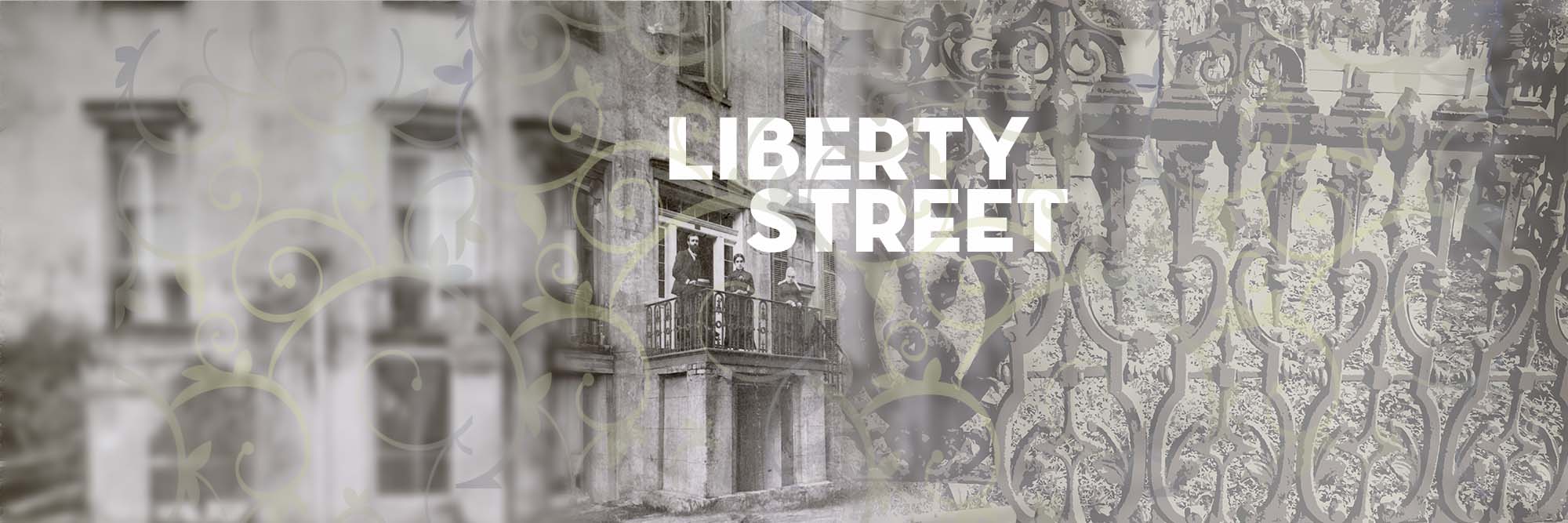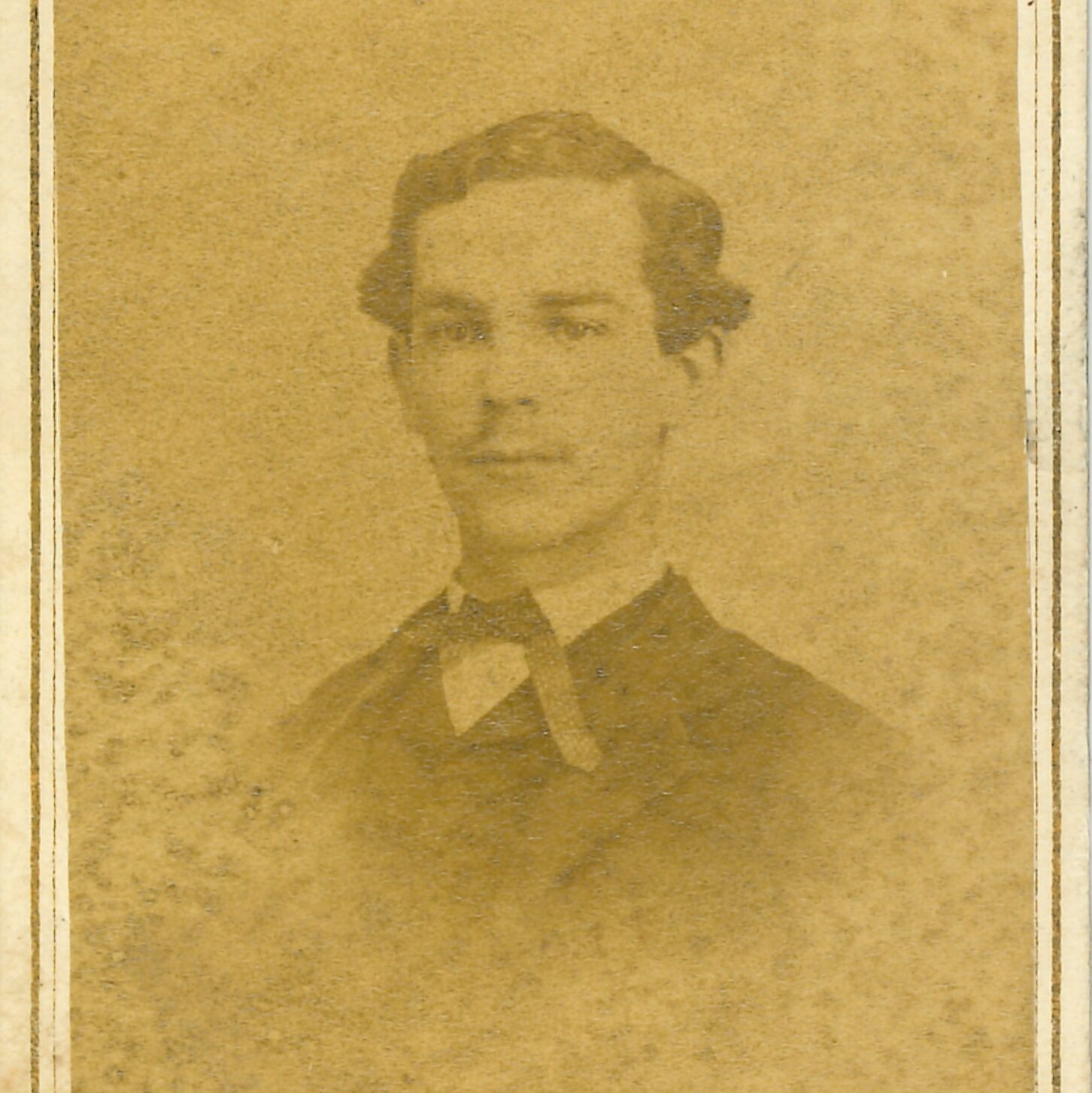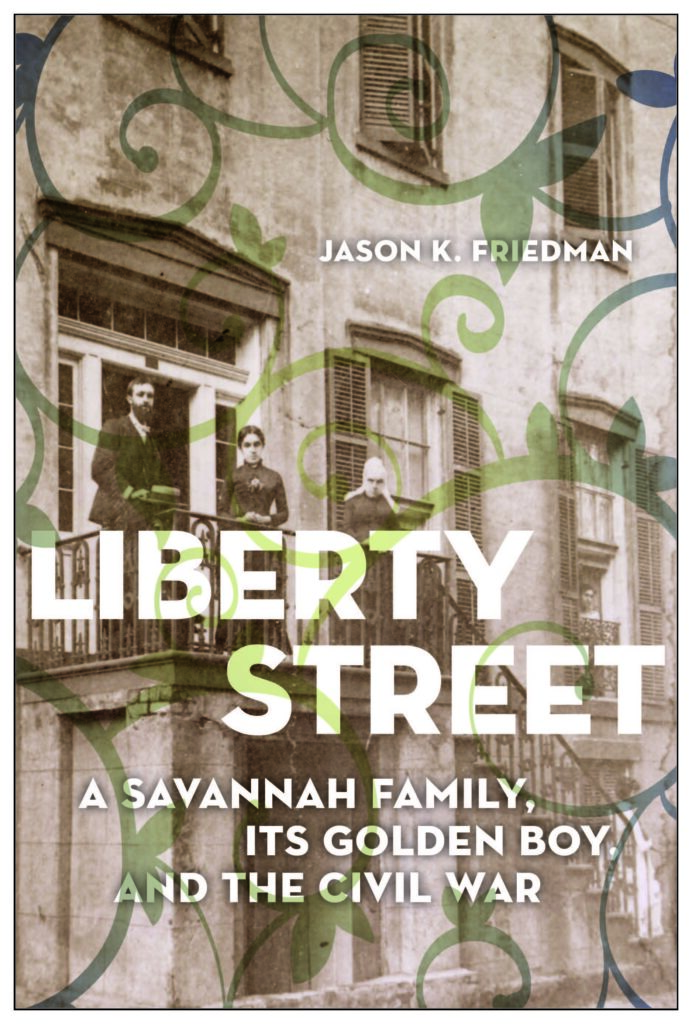
A Savannah Family, Its Golden Boy and the Civil War
As Jason K. Friedman renovated his flat in a grand 1875 town house in his hometown of Savannah, he discovered a portal to the past. Liberty Street takes the reader on Friedman’s personal journey to understand the history of the family who built the home. At the center of the story is a sensitive young man pulled between love and duty, a close-knit family straining under moral and political conflicts, and a city coming into its own.
The Cohens, part of a Sephardic community in London, arrived in South Carolina (ca. 1750), seeking economic opportunity and personal freedoms. Becoming founding members of the Charleston Jewish community,they built home and community in the American South and rose from shopkeepers to success in business, politics, and high society in Savannah, one of the principal cities of the Confederacy. At the height of their success, the Cohens met tragedy, when their twenty-year-old golden boy, Gratz, was killed in battle wearing Rebel Grey, just weeks before the end of the Civil War.
Friedman draws on letters, diaries, and his experiences traveling from Georgia to Virginia to uncover these hidden histories and explore the ways place and collective memory haunt the present. At a moment when the hard light of truth shines on gauzy lost-cause myths, Liberty Street is a timely work of historical sleuthing.
Available soon from these online retailers:
University of South Carolina Press


Chapter 21, an excerpt
After slipping out the night of March 21 across Mill Creek at Bentonville, leaving behind in the village those too sick to travel, and in the fields and woods, like a macabre trail of crumbs, hundreds of the dead, Johnston led his men, the better-off wounded and the merely exhausted, to Smithfield to recuperate. The general, discouraged but undaunted, wired Lee for help in taking on Sherman. But Francis O’Driscoll was done. The seventeen-year- old, a volunteer, had something more important to do than fight a hopeless war. He’d taken Belle—his own beloved animal had been shot out from under him—and ridden the fifty miles northwest to Raleigh, to the home of George and Margaret Mordecai.
Imagine what that ride to Raleigh was like for Frank. The landscape of sorrow through which he traveled was as varied as the physical terrain of swamps and overflowing streams and dense pinewoods that he traversed. Mismatched, rider and horse, and who knows how easily Frank could appeal to the Lord or find peace in His secret motives, as Gratz would have? Frank might not have had Providence, but he had certain cold facts. He’d lost his own beloved horse, he knew it was going to happen, that fresh sunny morning three days earlier. The poor substitute of Gratz’s horse was now the sole audience for Frank’s tears—and for the rehearsal of what he’d say once he got to Raleigh, where Gratz’s relatives didn’t know they were waiting for the news.
Why do I think Frank was riding Gratz’s horse? There’s no evidence for this at all. Margaret’s letter to Emma points out that Frank’s horse was killed but doesn’t say what happened to Gratz’s. I suppose I respond to the terrible symmetry of the situation: Frank survived, but not his horse. Gratz died, but Belle did not.
And if Belle was the horse Frank rode to Raleigh, then she too would have been bereft, and found comfort in her role as confidante. It was familiar to her, the human voice around her as she moved through the world. The “petty sorrows” that Gratz said he unburdened to her now thundered in the full-on grief of his best friend. The nice boy who’d lived in his lumi- nous neighbor’s shadow his whole life.
Frank might have known that Gratz had relatives in Raleigh from spending the past three months by his friend’s side. Or perhaps Frank learned of Margaret and George Mordecai from the letter he found when he rushed to Gratz’s body “very soon after the fatal ball was shed,” accord- ing to Margaret. And so instead of the Jewish prince, it was his Gentile best friend who showed up at the door of the Mordecai residence.
He wasn’t the first stranger to appear. How they knew to come, I don’t know, but that Greek Revival mansion on a street of temples to wealth was full of wounded men, the sickest of them out of sight in their rooms that evening while the relatives come to care for them crowded round the sup- per table alongside those soldiers able to do the same. And among them now Frank O’Driscoll, with nothing wrong with him but an empty belly. He must have felt this too, survivor’s guilt, without even the comfort of having a term for it. Frank alone with his thoughts amid the commotion and Margaret too busy to do more than glance his way, much less have a word with him. And so after supper, when the dining room was empty and Frank had gone upstairs, she sent for him to come down to talk.
Margaret was an heiress and devout woman, physically weakened for ten years now from the loss of her only child, a stillborn. She was a lifelong member of the Church of Christ—George, a captain of industry and bank president, had converted to Christianity on the death of his father, the same year, 1838, that Solomon Cohen moved to Savannah after the death of his father—and so she was primed to see Gratz as a martyr. But perhaps Margaret’s religiousness predisposed her also to the liberating power of the truth. That’s what she wanted from Frank—the truth.
After riding up that afternoon and cleaning up, Frank had met with the master of the house, in the sanctuary of George’s study. This was the offi- cial part of the stay, where Frank stated the purpose of his visit and George questioned him on the details. The movements of men on the battlefield. The timing of that last advance. The burial, technical details of, nature of prayers pronounced. The display of articles Frank found on the body where it fell, as well as the catalog of those that had been snatched before he could get there. And then the older man shook the younger’s hand, called for him to be shown to his room, and sat down again at his desk. He took out a fresh sheet of paper, dipped pen into ink. The addressee everyone’s confidante, his sister Emma Mordecai.
All this George conveyed to his wife, who still felt something was missing.
Where did the older woman and the young soldier sit? Perhaps at the same table that had been so crowded earlier in the evening. A candle between them, maybe a pitcher of water and two glasses, likely nothing stronger than this.
From Margaret’s letter I imagine the scene. The candlelight illuminates Frank’s face from below, the gaunt sleepy childish visage gone red and demonic looking, a thought Margaret quickly pushes from her mind. She pours him a glass and urges him to drink. But at first Frank won’t talk, no more than to punctuate her own remarks with a syllable or two of his own. An unpracticed interrogator, Margaret is the one doing all the talking. She feels what she believes Frank is feeling, what Emma surely will when she reads her husband’s letter.
How it must pain you to recall the events of that terrible day, Margaret says.
Yes ma’am, Frank replies.
But for the sake of those who loved him, if you could, while it is fresh in your memory—
Yes ma’am.
That day, that afternoon, for I understand it was in the afternoon when your dear friend fell—
End of the day, yes ma’am.
And then nothing but the silence of the room. It’s quiet a long time. Margaret’s already halting words have run up against a wall. And as she collects her thoughts and tries to hold back tears, it happens. Out of the dead intractable silence, sound. Frank O’Driscoll has begun to talk.